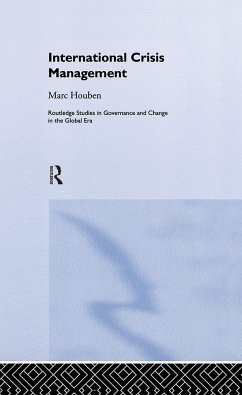- Gebundenes Buch
- Merkliste
- Auf die Merkliste
- Bewerten Bewerten
- Teilen
- Produkt teilen
- Produkterinnerung
- Produkterinnerung
Over the past fifty years, crisis management has become essential to achieving and maintaining national security. This book offers a comparative analysis of the preconditions and constraints nine European states place on their participation in international crisis management operations and the important consequences of such decisions, and provides a theoretical framework to help the reader understand this complex decision-making process.
Andere Kunden interessierten sich auch für
![A Globalizing World? A Globalizing World?]() David Held (ed.)A Globalizing World?230,99 €
David Held (ed.)A Globalizing World?230,99 €![Quality Management Essentials Quality Management Essentials]() David HoyleQuality Management Essentials169,99 €
David HoyleQuality Management Essentials169,99 €![Management Management]() Peter DruckerManagement171,99 €
Peter DruckerManagement171,99 €![Marketing Research for Non-profit, Community and Creative Organizations Marketing Research for Non-profit, Community and Creative Organizations]() Bonita KolbMarketing Research for Non-profit, Community and Creative Organizations187,99 €
Bonita KolbMarketing Research for Non-profit, Community and Creative Organizations187,99 €![International Human Rights, Decolonisation and Globalisation International Human Rights, Decolonisation and Globalisation]() Shelley WrightInternational Human Rights, Decolonisation and Globalisation167,99 €
Shelley WrightInternational Human Rights, Decolonisation and Globalisation167,99 €![An Introduction to Capitalism An Introduction to Capitalism]() Paul SwansonAn Introduction to Capitalism216,99 €
Paul SwansonAn Introduction to Capitalism216,99 €![The Foundations of Female Entrepreneurship The Foundations of Female Entrepreneurship]() Alison KayThe Foundations of Female Entrepreneurship185,99 €
Alison KayThe Foundations of Female Entrepreneurship185,99 €-
-
-
Over the past fifty years, crisis management has become essential to achieving and maintaining national security. This book offers a comparative analysis of the preconditions and constraints nine European states place on their participation in international crisis management operations and the important consequences of such decisions, and provides a theoretical framework to help the reader understand this complex decision-making process.
Produktdetails
- Produktdetails
- Verlag: Routledge
- Seitenzahl: 340
- Erscheinungstermin: 10. Dezember 2004
- Englisch
- Abmessung: 235mm x 157mm x 25mm
- Gewicht: 703g
- ISBN-13: 9780415354554
- ISBN-10: 0415354552
- Artikelnr.: 21206767
- Herstellerkennzeichnung
- Libri GmbH
- Europaallee 1
- 36244 Bad Hersfeld
- gpsr@libri.de
- Verlag: Routledge
- Seitenzahl: 340
- Erscheinungstermin: 10. Dezember 2004
- Englisch
- Abmessung: 235mm x 157mm x 25mm
- Gewicht: 703g
- ISBN-13: 9780415354554
- ISBN-10: 0415354552
- Artikelnr.: 21206767
- Herstellerkennzeichnung
- Libri GmbH
- Europaallee 1
- 36244 Bad Hersfeld
- gpsr@libri.de
Marc Houben holds master's degrees in philosophy and information management and a doctorate in social sciences. He has written about issues in philosophy, public policy, strategy and security and saw action in several crisis management operations as an officer in the Royal Netherlands Marine Corps.
Part One: Problem definition and framework of analysis
1. Introduction and plan of the book
1.1 The double political problem of international crisis management
1.2 Preconditions versus 'criteria for intervention'
1.3 Research questions and methodology
1.4 Defining the key terms: ambiguities and conundrums
2. Elements of change
2.1 The twin processes of normalisation and domestication
2.2 Process and principles of self-organisation
2.3 On the nature of the crisis
3. Three propositions
3.1 States are sovereign, only marginally free
3.2 The imperative of cooperation
3.3 All states are constrained
Part Two: The case studies: a comparative analysis
4. Changing the rules:Belgium and the Netherlands
4.1 Belgium
4.2 The Netherlands
4.3 Concluding remarks
5. The imperative of consensus: Denmark and Norway
5.1 Denmark
5.2 Norway
5.3 Concluding remarks
6. The dominant government: the United Kingdom, France and Spain
6.1 The United Kingdom
6.2 France
6.3 Spain
6.4 Concluding remarks
7. The dominant parliament: Germany and Italy
7.1 Germany
7.2 Italy
7.3 Concluding remarks
Part Three: Comparative analysis and conclusions
8. National preconditions and multinational action
8.1 Nature and charactersistics of the national decision-making process
8.2 Do participation decisions fit a general pattern?
8.3 How and why do governments precondition their participation?
8.4 What are the consequences for multinational action?
9. The relation between government and parliament
9.1 Binding the government
9.2 Obtaining and sustaining domestic support
9.3 Does national decision-making improve if preconditions are formalised?
9.4 Parliamentary scrutiny and evaluation
9.5 Parliament as a democratic learning mechanism
Annex. The review framework of the Netherlands
1. Introduction and plan of the book
1.1 The double political problem of international crisis management
1.2 Preconditions versus 'criteria for intervention'
1.3 Research questions and methodology
1.4 Defining the key terms: ambiguities and conundrums
2. Elements of change
2.1 The twin processes of normalisation and domestication
2.2 Process and principles of self-organisation
2.3 On the nature of the crisis
3. Three propositions
3.1 States are sovereign, only marginally free
3.2 The imperative of cooperation
3.3 All states are constrained
Part Two: The case studies: a comparative analysis
4. Changing the rules:Belgium and the Netherlands
4.1 Belgium
4.2 The Netherlands
4.3 Concluding remarks
5. The imperative of consensus: Denmark and Norway
5.1 Denmark
5.2 Norway
5.3 Concluding remarks
6. The dominant government: the United Kingdom, France and Spain
6.1 The United Kingdom
6.2 France
6.3 Spain
6.4 Concluding remarks
7. The dominant parliament: Germany and Italy
7.1 Germany
7.2 Italy
7.3 Concluding remarks
Part Three: Comparative analysis and conclusions
8. National preconditions and multinational action
8.1 Nature and charactersistics of the national decision-making process
8.2 Do participation decisions fit a general pattern?
8.3 How and why do governments precondition their participation?
8.4 What are the consequences for multinational action?
9. The relation between government and parliament
9.1 Binding the government
9.2 Obtaining and sustaining domestic support
9.3 Does national decision-making improve if preconditions are formalised?
9.4 Parliamentary scrutiny and evaluation
9.5 Parliament as a democratic learning mechanism
Annex. The review framework of the Netherlands
Part One: Problem definition and framework of analysis
1. Introduction and plan of the book
1.1 The double political problem of international crisis management
1.2 Preconditions versus 'criteria for intervention'
1.3 Research questions and methodology
1.4 Defining the key terms: ambiguities and conundrums
2. Elements of change
2.1 The twin processes of normalisation and domestication
2.2 Process and principles of self-organisation
2.3 On the nature of the crisis
3. Three propositions
3.1 States are sovereign, only marginally free
3.2 The imperative of cooperation
3.3 All states are constrained
Part Two: The case studies: a comparative analysis
4. Changing the rules:Belgium and the Netherlands
4.1 Belgium
4.2 The Netherlands
4.3 Concluding remarks
5. The imperative of consensus: Denmark and Norway
5.1 Denmark
5.2 Norway
5.3 Concluding remarks
6. The dominant government: the United Kingdom, France and Spain
6.1 The United Kingdom
6.2 France
6.3 Spain
6.4 Concluding remarks
7. The dominant parliament: Germany and Italy
7.1 Germany
7.2 Italy
7.3 Concluding remarks
Part Three: Comparative analysis and conclusions
8. National preconditions and multinational action
8.1 Nature and charactersistics of the national decision-making process
8.2 Do participation decisions fit a general pattern?
8.3 How and why do governments precondition their participation?
8.4 What are the consequences for multinational action?
9. The relation between government and parliament
9.1 Binding the government
9.2 Obtaining and sustaining domestic support
9.3 Does national decision-making improve if preconditions are formalised?
9.4 Parliamentary scrutiny and evaluation
9.5 Parliament as a democratic learning mechanism
Annex. The review framework of the Netherlands
1. Introduction and plan of the book
1.1 The double political problem of international crisis management
1.2 Preconditions versus 'criteria for intervention'
1.3 Research questions and methodology
1.4 Defining the key terms: ambiguities and conundrums
2. Elements of change
2.1 The twin processes of normalisation and domestication
2.2 Process and principles of self-organisation
2.3 On the nature of the crisis
3. Three propositions
3.1 States are sovereign, only marginally free
3.2 The imperative of cooperation
3.3 All states are constrained
Part Two: The case studies: a comparative analysis
4. Changing the rules:Belgium and the Netherlands
4.1 Belgium
4.2 The Netherlands
4.3 Concluding remarks
5. The imperative of consensus: Denmark and Norway
5.1 Denmark
5.2 Norway
5.3 Concluding remarks
6. The dominant government: the United Kingdom, France and Spain
6.1 The United Kingdom
6.2 France
6.3 Spain
6.4 Concluding remarks
7. The dominant parliament: Germany and Italy
7.1 Germany
7.2 Italy
7.3 Concluding remarks
Part Three: Comparative analysis and conclusions
8. National preconditions and multinational action
8.1 Nature and charactersistics of the national decision-making process
8.2 Do participation decisions fit a general pattern?
8.3 How and why do governments precondition their participation?
8.4 What are the consequences for multinational action?
9. The relation between government and parliament
9.1 Binding the government
9.2 Obtaining and sustaining domestic support
9.3 Does national decision-making improve if preconditions are formalised?
9.4 Parliamentary scrutiny and evaluation
9.5 Parliament as a democratic learning mechanism
Annex. The review framework of the Netherlands
Part One: Problem definition and framework of analysis
1. Introduction and plan of the book
1.1 The double political problem of international crisis management
1.2 Preconditions versus 'criteria for intervention'
1.3 Research questions and methodology
1.4 Defining the key terms: ambiguities and conundrums
2. Elements of change
2.1 The twin processes of normalisation and domestication
2.2 Process and principles of self-organisation
2.3 On the nature of the crisis
3. Three propositions
3.1 States are sovereign, only marginally free
3.2 The imperative of cooperation
3.3 All states are constrained
Part Two: The case studies: a comparative analysis
4. Changing the rules:Belgium and the Netherlands
4.1 Belgium
4.2 The Netherlands
4.3 Concluding remarks
5. The imperative of consensus: Denmark and Norway
5.1 Denmark
5.2 Norway
5.3 Concluding remarks
6. The dominant government: the United Kingdom, France and Spain
6.1 The United Kingdom
6.2 France
6.3 Spain
6.4 Concluding remarks
7. The dominant parliament: Germany and Italy
7.1 Germany
7.2 Italy
7.3 Concluding remarks
Part Three: Comparative analysis and conclusions
8. National preconditions and multinational action
8.1 Nature and charactersistics of the national decision-making process
8.2 Do participation decisions fit a general pattern?
8.3 How and why do governments precondition their participation?
8.4 What are the consequences for multinational action?
9. The relation between government and parliament
9.1 Binding the government
9.2 Obtaining and sustaining domestic support
9.3 Does national decision-making improve if preconditions are formalised?
9.4 Parliamentary scrutiny and evaluation
9.5 Parliament as a democratic learning mechanism
Annex. The review framework of the Netherlands
1. Introduction and plan of the book
1.1 The double political problem of international crisis management
1.2 Preconditions versus 'criteria for intervention'
1.3 Research questions and methodology
1.4 Defining the key terms: ambiguities and conundrums
2. Elements of change
2.1 The twin processes of normalisation and domestication
2.2 Process and principles of self-organisation
2.3 On the nature of the crisis
3. Three propositions
3.1 States are sovereign, only marginally free
3.2 The imperative of cooperation
3.3 All states are constrained
Part Two: The case studies: a comparative analysis
4. Changing the rules:Belgium and the Netherlands
4.1 Belgium
4.2 The Netherlands
4.3 Concluding remarks
5. The imperative of consensus: Denmark and Norway
5.1 Denmark
5.2 Norway
5.3 Concluding remarks
6. The dominant government: the United Kingdom, France and Spain
6.1 The United Kingdom
6.2 France
6.3 Spain
6.4 Concluding remarks
7. The dominant parliament: Germany and Italy
7.1 Germany
7.2 Italy
7.3 Concluding remarks
Part Three: Comparative analysis and conclusions
8. National preconditions and multinational action
8.1 Nature and charactersistics of the national decision-making process
8.2 Do participation decisions fit a general pattern?
8.3 How and why do governments precondition their participation?
8.4 What are the consequences for multinational action?
9. The relation between government and parliament
9.1 Binding the government
9.2 Obtaining and sustaining domestic support
9.3 Does national decision-making improve if preconditions are formalised?
9.4 Parliamentary scrutiny and evaluation
9.5 Parliament as a democratic learning mechanism
Annex. The review framework of the Netherlands
Part One: Problem definition and framework of analysis
1. Introduction and plan of the book
1.1 The double political problem of international crisis management
1.2 Preconditions versus 'criteria for intervention'
1.3 Research questions and methodology
1.4 Defining the key terms: ambiguities and conundrums
2. Elements of change
2.1 The twin processes of normalisation and domestication
2.2 Process and principles of self-organisation
2.3 On the nature of the crisis
3. Three propositions
3.1 States are sovereign, only marginally free
3.2 The imperative of cooperation
3.3 All states are constrained
Part Two: The case studies: a comparative analysis
4. Changing the rules:Belgium and the Netherlands
4.1 Belgium
4.2 The Netherlands
4.3 Concluding remarks
5. The imperative of consensus: Denmark and Norway
5.1 Denmark
5.2 Norway
5.3 Concluding remarks
6. The dominant government: the United Kingdom, France and Spain
6.1 The United Kingdom
6.2 France
6.3 Spain
6.4 Concluding remarks
7. The dominant parliament: Germany and Italy
7.1 Germany
7.2 Italy
7.3 Concluding remarks
Part Three: Comparative analysis and conclusions
8. National preconditions and multinational action
8.1 Nature and charactersistics of the national decision-making process
8.2 Do participation decisions fit a general pattern?
8.3 How and why do governments precondition their participation?
8.4 What are the consequences for multinational action?
9. The relation between government and parliament
9.1 Binding the government
9.2 Obtaining and sustaining domestic support
9.3 Does national decision-making improve if preconditions are formalised?
9.4 Parliamentary scrutiny and evaluation
9.5 Parliament as a democratic learning mechanism
Annex. The review framework of the Netherlands
1. Introduction and plan of the book
1.1 The double political problem of international crisis management
1.2 Preconditions versus 'criteria for intervention'
1.3 Research questions and methodology
1.4 Defining the key terms: ambiguities and conundrums
2. Elements of change
2.1 The twin processes of normalisation and domestication
2.2 Process and principles of self-organisation
2.3 On the nature of the crisis
3. Three propositions
3.1 States are sovereign, only marginally free
3.2 The imperative of cooperation
3.3 All states are constrained
Part Two: The case studies: a comparative analysis
4. Changing the rules:Belgium and the Netherlands
4.1 Belgium
4.2 The Netherlands
4.3 Concluding remarks
5. The imperative of consensus: Denmark and Norway
5.1 Denmark
5.2 Norway
5.3 Concluding remarks
6. The dominant government: the United Kingdom, France and Spain
6.1 The United Kingdom
6.2 France
6.3 Spain
6.4 Concluding remarks
7. The dominant parliament: Germany and Italy
7.1 Germany
7.2 Italy
7.3 Concluding remarks
Part Three: Comparative analysis and conclusions
8. National preconditions and multinational action
8.1 Nature and charactersistics of the national decision-making process
8.2 Do participation decisions fit a general pattern?
8.3 How and why do governments precondition their participation?
8.4 What are the consequences for multinational action?
9. The relation between government and parliament
9.1 Binding the government
9.2 Obtaining and sustaining domestic support
9.3 Does national decision-making improve if preconditions are formalised?
9.4 Parliamentary scrutiny and evaluation
9.5 Parliament as a democratic learning mechanism
Annex. The review framework of the Netherlands









